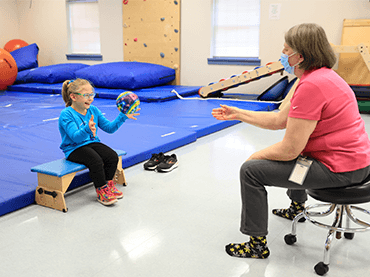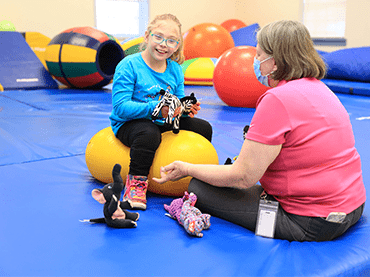The Challenge: Overcoming Multiple Birth Defects and Disorders
“She is our miracle baby,” says Missy of her 9-year-old daughter, Tru, who was born with multiple health problems. In addition to myelomeningocele (the severest form of spina bifida) and hydrocephalus, she has Turner syndrome, a malformed aortic valve, and a hole in her heart. She was given just a 3% chance of surviving.Within hours of her birth, Tru had surgery to close her back and insert a shunt in her head to drain spinal fluid. More surgeries followed. “At two weeks, she had open heart surgery to repair the aortic valve issue, and at six weeks, she had surgery to close the hole in her heart,” says Missy.
Missy will always be grateful to the early team of medical professionals that saved her daughter’s life, but both the spina bifida diagnosis and those essential surgeries slowed Tru’s development. “Waiting for her to roll over and sit up was painstakingly slow,” says Missy.
The Path to UPMC
Pennsylvania offers Early Intervention (EI) services that provide eligible children with disabilities from birth to age 5 with essential developmental services. Tru’s family immediately accessed EI services — including physical and occupational therapy — through the Lycoming/Clinton Joinder Board. When she turned 3, she was then serviced by BLaST IU#17 and once she became school age, she received services in school.“Our therapists began working with Tru in the home through the County EI program and have followed her through the BLaST IU program and through the schools.” says Denise Lorson, PT, a physical therapist with UPMC Pediatric Rehab in Williamsport who began seeing Tru at preschool for PT at age 3.
Tru’s year-round regimen includes in-school physical and occupational therapy, in addition to year-round outpatient physical therapy. During the summer, she receives outpatient occupational therapy to help provide the strength and flexibility Tru needs to stay active and moving. “She’s a resilient little girl who’s always smiling. We have a blast with her,” says Denise.
“Denise and her team are really good with Tru,” says Missy. “They have so much experience, and they are just the kindest people. Our family is very grateful that they’ve worked with Tru for so many years.”
The Solution
 Like many children born with myelomeningocele, Tru has no feeling from mid-thigh to her feet. “Since we started working with Tru, she has gained a lot of strength in her legs, upper body, and core muscles, which is important for standing and giving her more mobility,” says Denise. “And Tru is very independent in her wheelchair.”
Like many children born with myelomeningocele, Tru has no feeling from mid-thigh to her feet. “Since we started working with Tru, she has gained a lot of strength in her legs, upper body, and core muscles, which is important for standing and giving her more mobility,” says Denise. “And Tru is very independent in her wheelchair.”Now that she is older and stronger, Tru has started transitioning to a gait trainer — an assistive device that’s similar to a walker with a seat. Her current therapy focuses on exercises and techniques to improve her gait, muscle coordination, and balance. It will also help keep the curve in her spine from getting worse.
“Since Tru can’t stand or walk without assistance, the gait trainer gives her the support she needs to stand and walk,” says Missy. “She’s been doing extra physical therapy to help learn how to use it and she’s doing very well,” adds Denise.
The Results
Now a second grader in the Williamsport School District, Tru is a petite, blue-eyed blonde with a bubbly personality, plenty of energy, and a smile that lights up the room. “The girl is happy all the time,” says Missy. “She is a ray of sunshine, and we are very blessed to have her.”“Behind that sweet smile is a strong will and a fierce determination to do anything she wants to do,” says Missy. Tru’s family lives in Cogan Station, Pa., a small community in Lycoming County in central Pennsylvania, and loves to spend time outdoors. “That’s been a great motivation to get Tru moving,” says Denise.
“We hike a lot so we got her an adaptive trike so can she ride the trails along with us,” says Missy. Tru’s dad also plans to make her a small, accessible tree stand so she can go hunting with the family in the fall. “But Tru is a talker, so we’ll have to find a way to keep her quiet,” she adds with a laugh.
Denise says Tru’s family are the real heroes in her story. “Pediatric therapy isn’t going to make a real difference for a child unless the parents follow through with it on a daily basis,” explains Denise. “Tru’s parents are great to work with because they do everything we ask — and more — to support her.”

















